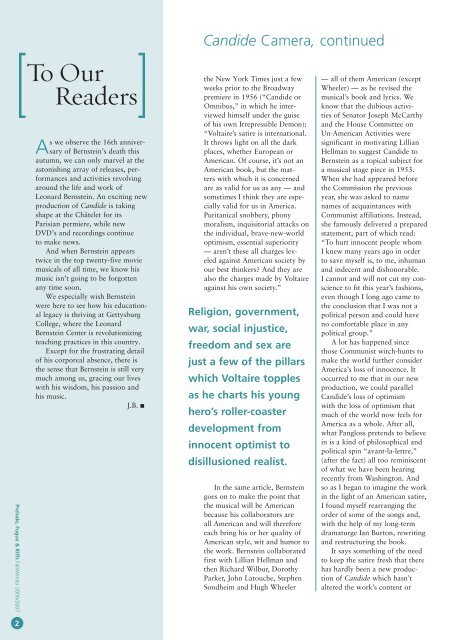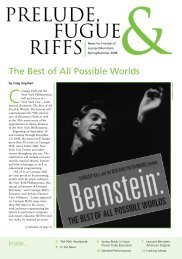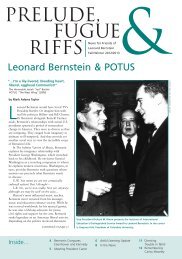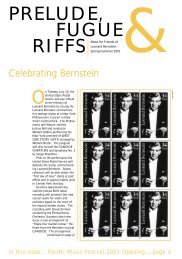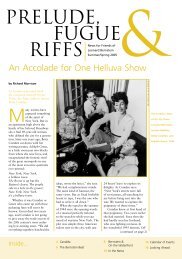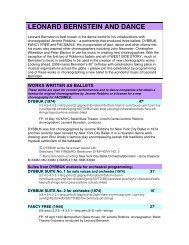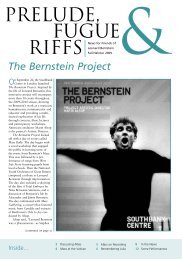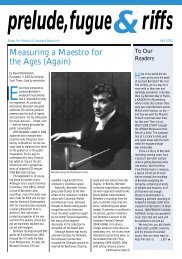Candide Camera - Leonard Bernstein
Candide Camera - Leonard Bernstein
Candide Camera - Leonard Bernstein
Create successful ePaper yourself
Turn your PDF publications into a flip-book with our unique Google optimized e-Paper software.
Prelude, Fugue & Riffs Fall/Winter 2006/2007<br />
2<br />
as we observe the 16th anniversary<br />
of <strong>Bernstein</strong>’s death this<br />
autumn, we can only marvel at the<br />
astonishing array of releases, performances<br />
and activities revolving<br />
around the life and work of<br />
<strong>Leonard</strong> <strong>Bernstein</strong>. An exciting new<br />
production of <strong>Candide</strong> is taking<br />
shape at the Châtelet for its<br />
Parisian permiere, while new<br />
DVD’s and recordings continue<br />
to make news.<br />
And when <strong>Bernstein</strong> appears<br />
twice in the top twenty-five movie<br />
musicals of all time, we know his<br />
music isn’t going to be forgotten<br />
any time soon.<br />
We especially wish <strong>Bernstein</strong><br />
were here to see how his educational<br />
legacy is thriving at Gettysburg<br />
College, where the <strong>Leonard</strong><br />
<strong>Bernstein</strong> Center is revolutionizing<br />
teaching practices in this country.<br />
Except for the frustrating detail<br />
of his corporeal absence, there is<br />
the sense that <strong>Bernstein</strong> is still very<br />
much among us, gracing our lives<br />
with his wisdom, his passion and<br />
his music.<br />
J.B. ■<br />
<strong>Candide</strong> <strong>Camera</strong>, continued<br />
the New York Times just a few<br />
weeks prior to the Broadway<br />
premiere in 1956 (“<strong>Candide</strong> or<br />
Omnibus,” in which he interviewed<br />
himself under the guise<br />
of his own Irrepressible Demon):<br />
“Voltaire’s satire is international.<br />
It throws light on all the dark<br />
places, whether European or<br />
American. Of course, it’s not an<br />
American book, but the matters<br />
with which it is concerned<br />
are as valid for us as any — and<br />
sometimes I think they are especially<br />
valid for us in America.<br />
Puritanical snobbery, phony<br />
moralism, inquisitorial attacks on<br />
the individual, brave-new-world<br />
optimism, essential superiority<br />
— aren’t these all charges leveled<br />
against American society by<br />
our best thinkers? And they are<br />
also the charges made by Voltaire<br />
against his own society.”<br />
Religion, government,<br />
war, social injustice,<br />
freedom and sex are<br />
just a few of the pillars<br />
which Voltaire topples<br />
as he charts his young<br />
hero’s roller-coaster<br />
development from<br />
innocent optimist to<br />
disillusioned realist.<br />
In the same article, <strong>Bernstein</strong><br />
goes on to make the point that<br />
the musical will be American<br />
because his collaborators are<br />
all American and will therefore<br />
each bring his or her quality of<br />
American style, wit and humor to<br />
the work. <strong>Bernstein</strong> collaborated<br />
first with Lillian Hellman and<br />
then Richard Wilbur, Dorothy<br />
Parker, John Latouche, Stephen<br />
Sondheim and Hugh Wheeler<br />
— all of them American (except<br />
Wheeler) — as he revised the<br />
musical’s book and lyrics. We<br />
know that the dubious activities<br />
of Senator Joseph McCarthy<br />
and the House Committee on<br />
Un-American Activities were<br />
significant in motivating Lillian<br />
Hellman to suggest <strong>Candide</strong> to<br />
<strong>Bernstein</strong> as a topical subject for<br />
a musical stage piece in 1953.<br />
When she had appeared before<br />
the Commission the previous<br />
year, she was asked to name<br />
names of acquaintances with<br />
Communist affiliations. Instead,<br />
she famously delivered a prepared<br />
statement, part of which read:<br />
“To hurt innocent people whom<br />
I knew many years ago in order<br />
to save myself is, to me, inhuman<br />
and indecent and dishonorable.<br />
I cannot and will not cut my conscience<br />
to fit this year’s fashions,<br />
even though I long ago came to<br />
the conclusion that I was not a<br />
political person and could have<br />
no comfortable place in any<br />
political group.”<br />
A lot has happened since<br />
those Communist witch-hunts to<br />
make the world further consider<br />
America’s loss of innocence. It<br />
occurred to me that in our new<br />
production, we could parallel<br />
<strong>Candide</strong>’s loss of optimism<br />
with the loss of optimism that<br />
much of the world now feels for<br />
America as a whole. After all,<br />
what Pangloss pretends to believe<br />
in is a kind of philosophical and<br />
political spin “avant-la-lettre,”<br />
(after the fact) all too reminiscent<br />
of what we have been hearing<br />
recently from Washington. And<br />
so as I began to imagine the work<br />
in the light of an American satire,<br />
I found myself rearranging the<br />
order of some of the songs and,<br />
with the help of my long-term<br />
dramaturge Ian Burton, rewriting<br />
and restructuring the book.<br />
It says something of the need<br />
to keep the satire fresh that there<br />
has hardly been a new production<br />
of <strong>Candide</strong> which hasn’t<br />
altered the work’s content or


